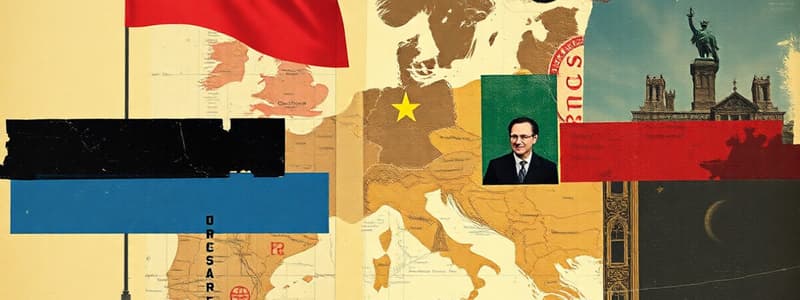Podcast
Questions and Answers
Juana Domitrescu's work with the Erasmus Plus program primarily focuses on which aspect of European integration?
Juana Domitrescu's work with the Erasmus Plus program primarily focuses on which aspect of European integration?
- Implementing strict regulations on international travel within Europe.
- Promoting cultural exchange and skill development among young Europeans. (correct)
- Enforcing a uniform set of European values across member states.
- Establishing a singular European identity rooted in historical political thought.
How does the 'constructivist approach' to European identity differ from the traditional approach?
How does the 'constructivist approach' to European identity differ from the traditional approach?
- It emphasizes the historical philosophical underpinnings of European unity.
- It seeks to implement a top-down political project for European integration.
- It focuses on how individual citizens perceive and identify with Europe. (correct)
- It prioritizes the economic benefits of the Erasmus Plus program.
Which of the following best describes the role of exchange programs like Erasmus Plus in shaping European identity?
Which of the following best describes the role of exchange programs like Erasmus Plus in shaping European identity?
- They primarily serve to reinforce existing national identities within a European context.
- They focus solely on academic achievements and offer limited cultural exposure.
- They offer opportunities for participants to experience different cultures and form their own understanding of European values. (correct)
- They dictate a specific set of European values to participating students.
What is 'internationalization at home,' and how does it relate to exchange programs like Erasmus Plus?
What is 'internationalization at home,' and how does it relate to exchange programs like Erasmus Plus?
What is a potential challenge associated with the 'top-down' approach to fostering European identity?
What is a potential challenge associated with the 'top-down' approach to fostering European identity?
According to the information provided, what influenced Juana Domitrescu's professional path?
According to the information provided, what influenced Juana Domitrescu's professional path?
How do short-term exchange programs, like Erasmus Plus, create a more profound impact than traditional tourism?
How do short-term exchange programs, like Erasmus Plus, create a more profound impact than traditional tourism?
What was the initial primary goal of the 'traditional' approach to European identity following the World Wars?
What was the initial primary goal of the 'traditional' approach to European identity following the World Wars?
According to Immanuel Kant's 18th-century ideas, which concept is most closely tied to the traditional way of understanding European identity?
According to Immanuel Kant's 18th-century ideas, which concept is most closely tied to the traditional way of understanding European identity?
What key element is required for people to truly 'take ownership' of being European according to the information?
What key element is required for people to truly 'take ownership' of being European according to the information?
Flashcards
Juana Domitrescu's Department
Juana Domitrescu's Department
A European Commission department focusing on education, culture, youth, and sports.
Higher Education Unit
Higher Education Unit
A unit within the European Commission dedicated to higher education initiatives.
Erasmus Plus Program
Erasmus Plus Program
An EU program promoting study and work abroad experiences for students and young people.
Erasmus Plus & European Solidarity Corps impact
Erasmus Plus & European Solidarity Corps impact
Signup and view all the flashcards
Traditional View of European Identity
Traditional View of European Identity
Signup and view all the flashcards
Europe's Initial Political Project
Europe's Initial Political Project
Signup and view all the flashcards
Constructivist Approach
Constructivist Approach
Signup and view all the flashcards
Short-term Exchanges
Short-term Exchanges
Signup and view all the flashcards
Internationalization at Home
Internationalization at Home
Signup and view all the flashcards
Study Notes
- Juana Domitrescu is from Romania and works at the European Commission.
- She is in the department of education, culture, youth, and sports.
- She specifically works in the higher education unit.
- Her unit focuses on the implementation and development of the Erasmus Plus program.
- Exchange programs like Erasmus Plus and the European Solidarity Corps do not promote a single set of European identity values.
- Instead, these programs provide opportunities for hands-on experience in different societies and communities.
- New generations define what European values mean to them through their participation in these programs.
- Her experience as an international student, researching European identity, and volunteering in an organisation where people identified as European influenced her professional path.
Two Ways of Looking at European Identity
- There is a traditional way of understanding European identity, rooted in philosophical and political thought.
- This concept involves building a Europe based on freedom, which stems from Immanuel Kant's 18th-century ideas.
- The impact of the two World Wars made this concept especially relevant.
- Initially, it was a political project to unite and establish shared European values and goals.
- The project aimed to foster collaboration based on freedom, democracy, and peace, rather than conflict.
- This top-down approach, while valuable, does not necessarily come from culture or society itself.
- The challenge lies in having people take ownership of being European through years of freedom.
- They are willing and able to travel and experience different countries.
- A constructivist approach looks at how European citizens identify with Europe or European values.
- It examines what they consider to be European or not European.
- Short-term exchanges like Erasmus Plus and the European Solidarity Corps expose people to different cultures and languages.
- Participants experience a different place in a more immersive way than when on holiday.
- They must immerse themselves in the new society and encounter different ideas and ways of doing things.
- This forces them to react and change, contributing to the notion of European identity.
- These programs equip young people with skills and views that they can use in both their host and home societies.
- This leads to "internationalization at home," where those changed by the experience can bring new ideas to their home society.
Studying That Suits You
Use AI to generate personalized quizzes and flashcards to suit your learning preferences.




